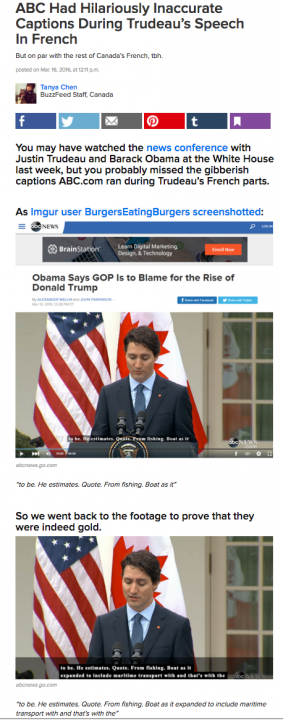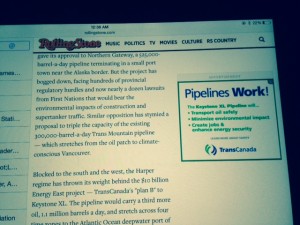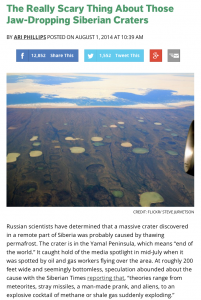Good for a Laugh—American Network Fails at French Translation of PM Trudeau
/1 Comment/in Global News, Media/by Philip TurnerThis is funny—@ABCNews had hilariously bad translations of @CanadianPM Trudeau's French during his DC visit. https://t.co/PjTtV1gKt3
— Philip Turner (@philipsturner) March 16, 2016
Transnational humor in a funny failure at ABC News, via Buzzfeed Canada. See below for a sampling, or click here for the whole rundown of botched captions inadvertently provided to US viewers by ABC.

Why Vetoing Keystone XL is not Futile
/0 Comments/in Global News, News, Politics, History & Media/by Philip TurnerI recommend Tim Dickinson’s excellent Rolling Stone article about the Obama administration’s refusal, at least to this point, to greenlight the Keystone XL pipeline, and the Harper government’s years-long efforts to tie virtually the entire Canadian economy to oil production. Dickinson hits on every key point about the fateful and disastrous choices made by Stephen Harper. It begins like this:
“Since ultraconservative Prime Minister Stephen Harper—famously described by one Canadian columnist as ‘our version of George W. Bush, minus the warmth and intellect’—took power in 2006, he’s quietly set his country on a course that seems to be straight from the Koch brothers’ road map. Harper, 55, has gutted environmental regulation and fast-tracked colossal projects to bring new oil to market. Under his leadership, Canada has also slashed corporate taxes and is eliminating 30,000 public-sector jobs….Stephen Harper came of age in Alberta, a land of cowboys and oil rigs sometimes referred to as ‘Texas of the North.’ He began his career in the mailroom of Imperial Oil (today an offshoot of Exxon). He rose through Parliament promising a revolution in federal affairs under the battle cry ‘The West wants in!’ Following his election to prime minister in 2006, he wasted little time unveiling his plan to open up his nation’s vast oil reserves. Before an audience of British businessmen in 2006, he spoke of ‘the emerging energy superpower our government intends to build,’ and rhapsodized about the ‘ocean of oil-soaked sand [that] lies under the muskeg of northern Alberta.’ He framed the challenge of bringing that crude to market as though it were a Wonder of the World. ‘It requires vast amounts of capital . . . and an army of skilled workers,’ he said. ‘It is an enterprise of epic proportions, akin to the building of the pyramids or China’s Great Wall. Only bigger.'”
The grandiosity is staggering, reminiscent to me of the early years of George W. Bush’s disastrous presidency.
Many American observers, even some generally alarmed by climate change, have noted what they consider to be a pointlessness to President Obama declining to okay Keystone XL, considering that the amount of oil to be carried by KXL is only a fraction of the volume being carried in other pipelines already, and that too much oil is now being shipped by rail, a risk as great as pipeline spills. Yet, this misses a key point: Harper has staked his total transformation of the Canadian economy to this pipeline, in line with companies such as TransCanada, the backer of Keystone XL, or to the creation of two other pipelines that are vigorously opposed by many Canadians. One of these would go west from Alberta through British Columbia to the Pacific Ocean, while the other would go east toward the Maritimes and the Atlantic. If he is unable to build any of these three, his intention to mine the great bulk of the tar sands is less likely to be realized. To the extent that the Obama administration can impede those grandiose designs, even if that isn’t the point of American policy, it will be a good thing from my viewpoint, because I believe that harvesting the entirety of the tar sands will inevitably hasten planetary change that we dare not risk.
One side note that amused me while reading Dickinson’s article: a cheery ad from TransCanada popped up in my browser, endorsing the idea that “Pipelines Work!” Doubtless, it appeared because the name TransCanada was on that page of the Rolling Stone article. See the screenshot below. I highly recommend you read Dickinson’s entire article.
A Week of Worrisome News about the Siberian Permafrost & Arctic Ocean
/0 Comments/in Global News, News, Politics, History & Media/by Philip Turner‘Two New Holes Mysteriously Appear in Siberia’ http://t.co/I4IJUNBZk4 #headlinesyoudidn‘tseeintimemagazinebeforetheinternet
— Robert Wright (@robertwrighter) July 29, 2014
This tweet of author Robert Wright that I shared linked to a TIME magazine story about mysterious craters in Siberia, and an aerial video view of the holes in the earth.
Later, I read another story, in ThinkProgress, suggesting that the emergence of these holes in the earth may well be the result of permafrost melting in the Arctic tundra, auguring an accompanying release of tons of methane gas, a worrisome development that if correct bodes ill for its effect on the global climate. Here’s a screenshot from the article by Ari Phillips.
 The next day, I read Fred Barbash’s Washington Post article about the appearance of huge sea sells in the Arctic Ocean, where only ice has been seen before. These two discoveries leave little doubt in my mind that the coldest places on the planet are warming in ways that are having a dramatic effect on earth and sea.
The next day, I read Fred Barbash’s Washington Post article about the appearance of huge sea sells in the Arctic Ocean, where only ice has been seen before. These two discoveries leave little doubt in my mind that the coldest places on the planet are warming in ways that are having a dramatic effect on earth and sea.
This can’t be good–“16 foot wave swells reported in once-frozen region of Arctic Ocean,” reports @FBarbash. http://t.co/0erAo3W4kD — Philip Turner (@philipsturner) July 30, 2014
— Philip Turner (@philipsturner) July 30, 2014
A Useful Delay on Keystone XL Shows What Little Leverage PM Harper has with President Obama
/0 Comments/in Global News, News, Politics, History & Media/by Philip TurnerAs the LA Times reports this afternoon, ongoing litigation that is challenging the proposed Keystone XL pipeline over the probable effects it would have on a key aquifer in Nebraska will create a delay of several additional months in the Obama administration’s deliberations on the Alberta-Texas pipeline, pushing a decision until after the US’s mid-term elections next November. That’s helpful politically to the president and DEMs for several reasons covered in the story, but there’s an additional effect I don’t mind at all: it shows that ham-handed nudging of the president by Canadian Prime Minister Harper and his ministers, which in one notorious instance slandered environmental groups in Canada and the USA, and efforts mounted by companies like TransCanada, haven’t amounted to much in the way of effective pressure on the administration. If anything, it makes Harper look weak in regard to oil policy, supposedly his strength. That, plus significant challenges to the pipelines out west, including from First Nations Canadians, should set Harper back on his heels, even as the 2015 Canadian federal election nears.
I’m pleased as an American who follows Canadian politics, and as someone hoping to see the Alberta tar sands–with their high cost to the environment, and whose end product would burn with high emissions–stay in the ground. I’m also pleased that it displeases PM Harper and the drill-baby-drill crowd in the US, frustrating their zeal to exercise rapacity toward natural resources and the environment.
Amazing Women’s Olympic Hockey Gold Medal Game
/0 Comments/in Global News/by Philip Turner
Seconds after winning the #OlympicHockey gold medal game, the Canadian Women's team charge the ice in jubilation. pic.twitter.com/hGkEZEAsql
— Philip Turner (@philipsturner) February 20, 2014
